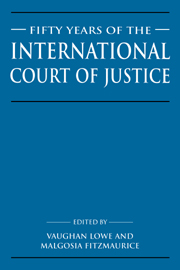Book contents
- Frontmatter
- Contents
- List of contributors
- Preface
- List of abbreviations
- Sir Robert Yewdall Jennings, by Vaughan Lowe
- List of publications of Sir Robert Jennings
- Table of cases
- Part I The International Court of Justice
- Part II The sources and evidences of international law
- Part III Substance of international law
- Part IV Procedural aspects of the work of the International Court of Justice
- 21 Procedural law and the International Court of Justice
- 22 The President of the International Court of Justice
- 23 Nationality of claims: some relevant concepts
- 24 The plea of domestic jurisdiction before the International Court of Justice: substance or procedure?
- 25 ‘Partial’ judgments and the inherent jurisdiction of the International Court of Justice
- 26 Intervention before the International Court of Justice
- 27 The use of Chambers of the International Court of Justice
- 28 The use of experts by the International Court of Justice
- 29 Provisional measures
- 30 Remedies in the International Court of Justice
- 31 A comment on the current health of Advisory Opinions
- Part V The International Court of Justice and the United Nations
- Index
31 - A comment on the current health of Advisory Opinions
Published online by Cambridge University Press: 02 November 2009
- Frontmatter
- Contents
- List of contributors
- Preface
- List of abbreviations
- Sir Robert Yewdall Jennings, by Vaughan Lowe
- List of publications of Sir Robert Jennings
- Table of cases
- Part I The International Court of Justice
- Part II The sources and evidences of international law
- Part III Substance of international law
- Part IV Procedural aspects of the work of the International Court of Justice
- 21 Procedural law and the International Court of Justice
- 22 The President of the International Court of Justice
- 23 Nationality of claims: some relevant concepts
- 24 The plea of domestic jurisdiction before the International Court of Justice: substance or procedure?
- 25 ‘Partial’ judgments and the inherent jurisdiction of the International Court of Justice
- 26 Intervention before the International Court of Justice
- 27 The use of Chambers of the International Court of Justice
- 28 The use of experts by the International Court of Justice
- 29 Provisional measures
- 30 Remedies in the International Court of Justice
- 31 A comment on the current health of Advisory Opinions
- Part V The International Court of Justice and the United Nations
- Index
Summary
It is appropriate, in a book of essays to mark Judge Sir Robert Jennings's eightieth birthday and the fiftieth anniversary of the Court, to take stock of the state of health of the Advisory Opinion. As this volume goes to press there are several matters relating to Advisory Opinions under consideration in the United Nations. There is debate as to whether the Secretary-General should be given authorization under article 96(2) of the Charter to request an Advisory Opinion. And there is discussion of the Court's future role in reviewing judgments of international Administrative Tribunals. The Court itself has been asked to give two new Advisory Opinions. And this will place under scrutiny the meaning of ‘legal questions arising within the scope of their activities’ in article 96(2) and ‘any legal question’ under article 96(1). But these interesting current matters should properly be seen against a background of the status of Advisory Opinions in the work of the Court.
The Advisory Opinion has from the outset been associated with a recurrent range of problems – certain technical and political problems concerning the request for, and the giving of, the Opinion. These difficulties have, over the years, attracted as much attention as the content of the Opinion itself. There has been different emphasis on different elements during the life of the Permanent Court and the International Court; but the constancy of troublesome themes is undeniable.
- Type
- Chapter
- Information
- Fifty Years of the International Court of JusticeEssays in Honour of Sir Robert Jennings, pp. 567 - 582Publisher: Cambridge University PressPrint publication year: 1996
- 3
- Cited by

